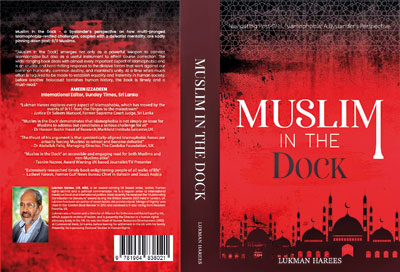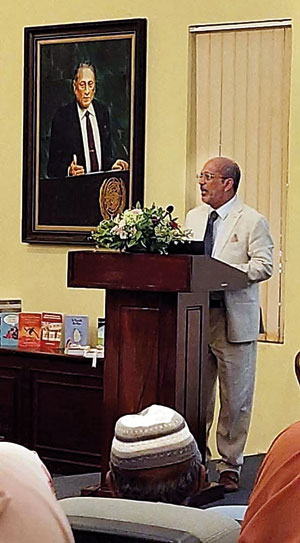Sunday Times 2
Unmasking Islamophobia: A new book exposes chilling realities
View(s):By Ameen Izzadeen
Are the Muslims being vilified and demonised because the imperialist-Zionist alliance sees Muslims as the primary obstacle—the threat—to their schemes aimed at global conquest?
Many scholars see that although the underlying need to demonise Muslims is primarily geopolitical, there are other reasons too for them to see only the dead Muslim as the good Muslim.
Demonising Islam and Muslims has a name—Islamophobia, the study of which is a critical tool to understand the wars and the conflicts that have been imposed on the Islamic world. There is a crying need for a comprehensive study on Islamophobia, which has two definitional manifestations: one is the irrational fear of Islam and Muslims; the other is hostility toward or hatred of Islam or Muslims in general. While the unwarranted fear of Islam can be, and is being, allayed through engagement and dialogue, Islamophobia stemming from hatred-driven hostility toward Islam and Muslims carries toxic designs with geopolitical and neocolonial undertones.
It is this type of Islamophobia that poses a threat to entire humanity and is a multibillion-dollar industry sustained primarily by the Zionists, pro-Zionist evangelists, and the arms industry, says a well-researched book by an erudite
Sri Lankan author, Lukman Harees.
His book “Muslim in the Dock” does answer questions on why Islam and Muslims are being vilified, demonised, and otherized. Why the only Islam Islamophobes know is the so-called radical Islam of the extremists and the terrorists; why they refuse to see Islam’s true nature—peace within oneself and peace all over the world.
The book also provides answers to questions such as, How do we deal with the Islamophobes? What is radical Islam? How is Islamophobia being institutionalised? Who are these Islamophobes? What are their aims? What is Zionism’s role in Islamophobia? Will there be a clash of civilisations?

Author Lukman Harees addressing the gathering at the book launch held on July 20 at the Lakshman Kadirgamar Institute in Colombo
I developed a great respect for Harees after reading his first book a decade or so ago and having the opportunity to review it. His latest book, ‘Muslim in the Dock,’ with a long subtitle—“A Bystander’s Perspective on How Multi-pronged Islamophobia-Related Challenges, Coupled with a Defeatist Mentality, Are Sadly Pinning Down Post-9/11 Muslims!”—deals with almost every aspect of Islamophobia in a manner and in detail that appeals to academics, activists, and humanists alike. He does so from a humanitarian perspective. This is because he has been throughout his adult life an activist and humanist. In his writing, a reader can sense the resolve we see in social reformers like Gandhi, Martin Luther King Jr., and Nelson Mandela, as they pursued their missions to bring about a peace-filled global order.
It was this spirit that drove him in 2012 to write one of his best books, The Mirage of Dignity on the Highway of Human Progress. ‘Muslim in the Dock’ is an extension of ‘The Mirage of Dignity on the Highway of Human Progress.’ The common thread that binds both these books together is Harees’ passionate dedication to upholding human dignity.
This book is for everyone who appreciates and upholds human dignity—for both Muslims and non-Muslims, people who yearn for a just, equitable, and peaceful world order.
In a note titled ‘Dedication’ in the beginning of his book, the author defines his audience. He says the book is dedicated to the valiant ‘Davids’ of the human race, working at full throttle, despite heavy odds, beyond the narrow confines of race and religion, to stand up against and defeat the ‘Goliaths’ initiating and sponsoring the evil enterprises of racism and Islamophobia in the post-09/11 world.
While reading the book, I felt Harees had been driven by two primary concerns to write the book. The first, to borrow a Shakespearean expression, was his lamentation that humanity has fled to the brutish beast. The other was his dejection, which he expresses in the book in these words:
“I was also particularly concerned about the increasing tempo of defeatism and paranoia that has been pervading the Muslim mind. I therefore began to pen down, from a bystander’s perspective, how multi-pronged Islamophobia-related challenges, coupled with a defeatist mentality, have been sadly pinning down post-9/11 Muslims.”
His was an attempt to bring the Muslims out of the dock.
The book focuses particularly, though not exclusively, on the post-9/11 tempo in Islamophobia, and it brings out the author’s wounded spirit, which becomes more determined and more resolute the more it is hurt by the growing injustices around it.
He captures vividly the post-9/11 Western agenda where politicians, media, academics, and opportunistic Islamophobes began to create a false sense of national insecurity over the “could-be” Muslim terrorists with insidious results. The author says, “In the aftermath of 9/11 and in the context of the War on Terror, Islam and Muslims thus became associated with and suspected of terrorism and anti-Americanism. While the political rhetoric of the Bush administration described the situation in terms of “us” against “them,” and the enemy as “evil,” conservative and anti-Islamic media sources increasingly depicted Islam as a threat to America and to the notion of freedom. Stereotypes of Middle Eastern, Muslim terrorists were reinforced by the entertainment media, in movies and television shows in post-9/11 America.”
The book dedicates separate chapters to discuss each of these concerns.
The book discerns the post-9/11 shenanigans and deceptions used in the vilification of Muslims and Islam and exposes Islamophobes and various organisations that exist to fuel Islamophobia and those who fund their sinister designs.
The book appears to be an antithesis to Samuel Huntington’s Clash of Civilisations—a work that enabled the post-9/11 Islamophobes to ‘otherize’ and demonise the Muslims as the ‘ideal enemy’ that is determined to destroy the Western civilisation. Harees’ book reminds one of Edward Said’s seminal work, Orientalism, where the great Palestinian scholar exposes the corruption in the Western thought that hypocritically denigrates Arab and Oriental culture, including that of Asia. In Harees’ work, one could see the resurrection of Said.
Also, extensively covered in the book is the media’s role in fuelling Islamophobia. A separate chapter focuses on the hypocrisy of the media, illustrated with numerous controversial instances where freedom of speech has been abused to publish deliberately provocative and hurtful content aimed at inciting Muslim anger. Covered in depth in this book is the role of social media in both fuelling Islamophobia and in countering it. The chapter presents chilling examples that not only exemplify the appalling misuse of social media but also serve as enduring evidence for readers and future generations to grasp the depths to which Islamophobes would stoop to portray Islam and its holy Prophet Muhammad in a deeply negative light.
With examples, the book rightly points out that Islamophobia is the new racism. Islamophobia is the new anti-Semitism. If not checked, it can lead to another Holocaust.
The book also says a searchlight should be thrown inward to see how and why the Muslims themselves have contributed to the continuation of Islamophobia and the hate campaign against them. The chapter on ‘CrISIS within’ tries to answer this, exposing the sponsors of Islamic terrorism and highlighting the damage ISIS-like terrorism has caused to Islam and Muslims.
The book is so wide-ranging that it deals with almost every important aspect of Islamophobia. Every chapter bears testimony to the years of hard work and laborious research that have gone into the making of this thought-provoking book.
The book, with more than 900 endnotes and references, is an erudite and hard-hitting response to the divisive forces that work against our common humanity, common destiny, and humanity’s unity. The easy-to-understand English amplifies the light the book radiates in the author’s humble effort to be part of a worthy effort to eradicate darkness.
Islamophobia is one of the most pressing issues the world faces today. If allowed to escalate, the day may not be far off when Muslims suffer a fate akin to that of the Jews in the early 20th century. The book emerges not only as a powerful weapon to combat Islamophobia but also as a useful instrument to effect course correction; it invites the misled to reason and sanity.
At a time when much effort must be made to establish equality and fraternity in human society, before another holocaust tarnishes human history, the book is timely and a must-read. Like all his previous books, Muslim in the Dock is my kind of book and a book for every human being striving for a peace- and justice-based world order.
(The book was launched in Harrow, UK, last month and in Colombo
last Sunday, with Western Province Governor Hanif Yusuf taking part as
chief guest. The author can be contacted on ml_harees@yahoo.co.uk.)

